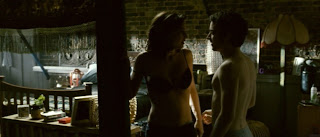Category: impulse buys / In category: 3 of 10 / Overall: 24 of 100

Why buy?
It was £3.00 (about $4.85).
And?
I’d enjoyed Guillermo Martinez’s novel – a short, highly readable and cleverly constructed mystery.
And?
A good cast, including the voluptuously appealing Leonor Watling.
The expectation
A cerebral murder mystery enlivened by a darkly European aesthetic and some classy performances.
On paper, this had real potential: an intellectual murder mystery predicated on logic puzzles and the question of whether an absolute truth can ever be established; a shoal of red herrings; a double-bluff finale; an appealing young American actor paired up with a heavyweight British thesp; and a director (Alex de la Iglesia) who’s proved himself in diverse genres (horror, comedy, drama) and can generally be relied on to bring a touch of the macabre to the proceedings.
The end product, though, is infuriating. Nothing quite gels. Whereas Elijah Wood turns in a thoughtful, often understated performance as Martin, an earnest young student hoping to gain the mentorship of respected academic Arthur Seldom (John Hurt), and Leonor Watling proves luscious and sparky as Lorna, the nurse he gets involved with, the other acting performances are all over the place.
John Hurt lightly seasons the scenery and proceeds to chew with relish. Jim Carter, sporting a Colonel Blimp style moustache, hams it up as a police inspector so dim-witted he makes your average giallo copper look like Sherlock Holmes. A bizarrely cast Dominique Pinon seems to be in another film entirely, Anna Massey veers into Mrs Rochester territory and Burn Gorman, as a fellow student in competition with Martin, plays all his scenes as if locked into a stare-it-out contest.
Then there’s the demented cameo by Alex Cox. Yes, that Alex Cox. His character is an obsessive researcher who stumbles on a pattern of answers to logic problems given by educationally substandard test subjects. Realising upon interviewing them that their decidedly left-of-centre reasoning demonstrates an internal logic equal to that of a conventional or even intellectually brilliant response, his determination to further his studies in this area – to unearth some new and radical perspective on the human mind – leads him to the company of the insane and irreparable damage to his own capacity for reason.
 It’s a powerhouse sequence: Cox gives it his all, while de la Iglesia, for the first and only time in the movie, really cuts loose in terms of imagery, immediacy and intensity. The pisser is, it turns out to be one of an inordinate number of red herrings. Granted, red herrings are part and parcel of the traditional murder mystery, but here they’re packed in like, er, sardines. Often inelegantly. Example: a scene in which a police psychologist speculates that the murderer is a repressed homosexual cuts to a scene where a minor character, drunk and with a chip on his shoulder, starts shouting, “I’m going to come out of the closet and arse-fuck the lot of you.” Oh dear, oh dear, oh dear.
It’s a powerhouse sequence: Cox gives it his all, while de la Iglesia, for the first and only time in the movie, really cuts loose in terms of imagery, immediacy and intensity. The pisser is, it turns out to be one of an inordinate number of red herrings. Granted, red herrings are part and parcel of the traditional murder mystery, but here they’re packed in like, er, sardines. Often inelegantly. Example: a scene in which a police psychologist speculates that the murderer is a repressed homosexual cuts to a scene where a minor character, drunk and with a chip on his shoulder, starts shouting, “I’m going to come out of the closet and arse-fuck the lot of you.” Oh dear, oh dear, oh dear.Indeed, with the film’s reliance on many archetypes of the genre (something the novel uses well, because it riffs on the literary form of the whodunnit in a way that’s pretty much impossible to translate to film), its pretentions to intellectualism and the Oxford setting, it’s hard not to imagine the ghost of Inspector Morse floating around in the background. And once that thought’s in your head, it’s hard to shake the notion that watching an episode of ‘Morse’ would constitute two hours better spent.
Still, ‘The Oxford Murders’ emerges as reasonably entertaining, the lovely Leonor is easy on the eye and there’s a sting in the tale that ensures the dreaming spires don’t get too dreamy. It’s average enough that there’s nothing to get excited about, yet accomplished enough that a harsher review would be bad sportsmanship.
Good buy/bad buy?
There’s probably another viewing in it, but ultimately this should have been a rental, not a purchase.


Tidak ada komentar:
Posting Komentar